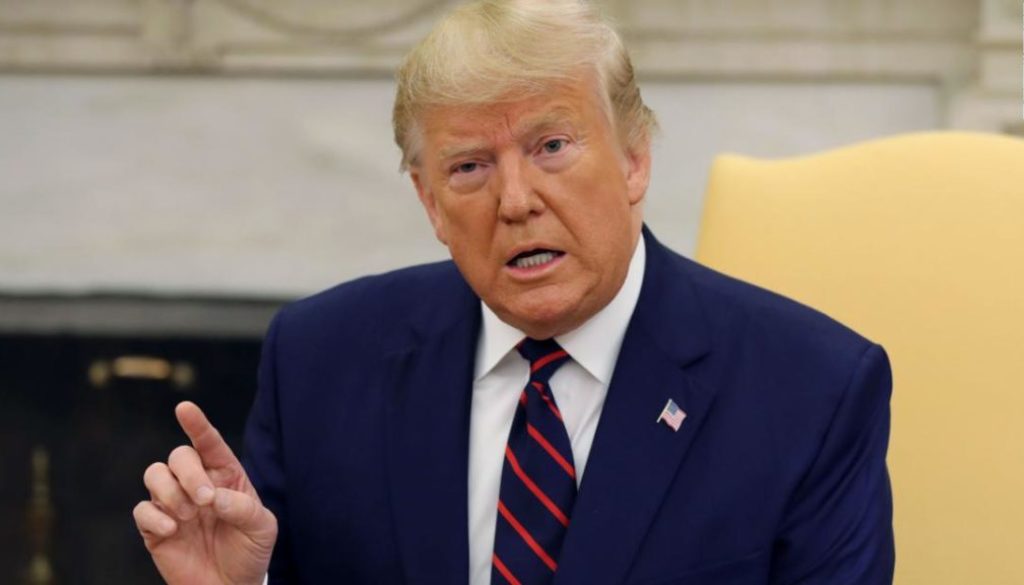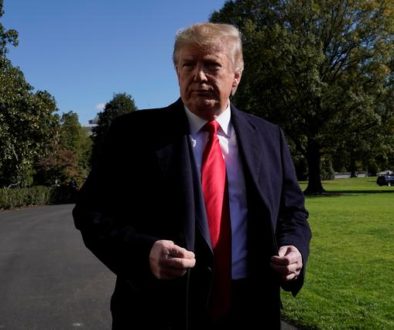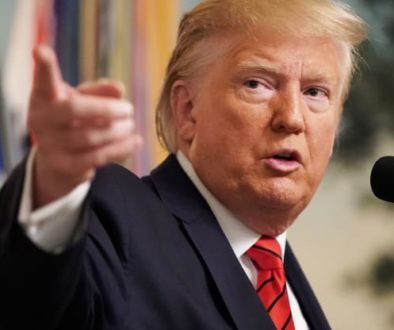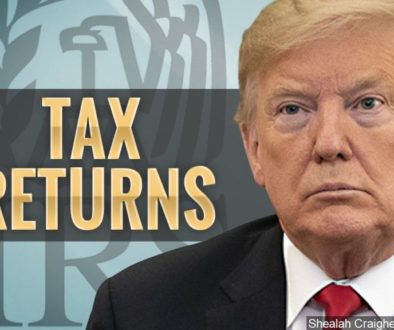Washington (CNN)Thousands of pages of transcripts are piling up, and top minds from both political parties are preparing their best strategy as the impeachment investigation into President Donald Trump moves into a new phase Wednesday with the first public hearings.
A clearer picture of Trump’s dealings with Ukraine has finally emerged after weeks of testimony from key witnesses. At the heart of the inquiry is whether Trump used the powers of his office to pressure Ukraine to help his reelection by announcing investigations into his political opponents.
Trump could become the third president in American history to be impeached. The United States Constitution says the sitting President “shall be removed from Office on Impeachment for, and Conviction of, Treason, Bribery, or other high Crimes and Misdemeanors.” Democrats and Republicans will fight in the coming weeks over whether Trump crossed that threshold.
CNN spoke to legal experts and analysts from both sides of the political spectrum to break down all the evidence, and to tally up the strongest points for and against impeaching Trump.
The case for impeaching Trump:
Trump solicited election meddling from Ukraine
Democrats believe this might be the slam dunk against Trump. The whistleblower said it first, and it has been corroborated by multiple witnesses: “The President of the United States is using the power of his office to solicit interference from a foreign country in the 2020 US election.”
Trump made the request directly to Ukrainian President Volodymyr Zelensky. This is clear from the rough transcript of their July 25 phone call, which was released by the White House.
After an exchange of pleasantries, Trump said the US had been “very good to Ukraine” but the relationship was not “reciprocal.” Zelensky thanked Trump for providing Ukraine with military assistance and said he was almost ready to purchase additional anti-tank missiles from the US.
Diplomats appointed by Trump later told Ukrainian officials that Zelensky needed to publicly announce the probes, which is very rarely done in legitimate criminal investigations. This strongly suggests the plan was designed to maximize political damage to Biden’s presidential campaign and was not motivated a by a sincere effort to root out corruption, as Trump claimed.
“The Ukraine situation encapsulates almost exactly what impeachment was created to address,” said CNN legal analyst Michael Gerhardt, who was called as a nonpartisan expert witness on impeachment during the Clinton hearings. “When the Framers talked about impeachable offenses, they mentioned the President engaging in a corrupt relationship with a foreign power.”
Trump responded, “I would like you to do us a favor though,” and asked Zelensky to investigate a conspiracy theory that would help him undermine the Russia investigation. Later in the call, Trump asked Zelensky to investigate former Vice President Joe Biden, a leading 2020 rival.
There was a quid pro quo for a White House invite
Merriam-Webster’s dictionary defines a quid pro quo as “something given or received for something else.” Multiple witnesses have testified that the Trump administration tried to establish a quid pro quo with Ukraine to secure investigations into Biden and the Democrats.
“I think it’s very likely that the Democrats will be able to show that there were conditions to presidential actions on Ukraine,” said CNN legal analyst Ross Garber, a leading expert on impeachment. “Then the question becomes, were those conditions legitimate or illegitimate?”
One element of the allegedly improper arrangement included withholding a White House invitation from Zelensky. The clearest evidence of this comes from a text message sent by Kurt Volker, who was Trump’s handpicked envoy for Ukraine, to top Zelensky aide Andrey Yermak.
Volker texted Yermak right before Trump called Zelensky. He said: “Heard from White House — assuming President Z convinces trump he will investigate / ‘get to the bottom of what happened’ in 2016, we will nail down date for visit to Washington. Good luck! See you tomorrow.”
Lt. Col. Alexander Vindman, the top Ukraine expert on the White House’s National Security Council, listened in on the Trump-Zelensky call. He later testified that based on the “vast” power disparity between the two leaders, Trump’s request would have been interpreted as “a demand” and that Zelensky would need to “fulfill this particular prerequisite in order to get the meeting.”
There was a quid pro quo for US military aid
In addition to dangling the White House visit, the Trump administration froze $391 million in military and security assistance to Ukraine, which is still at war with Russia and Kremlin-backed militias. Weeks later, US Ambassador to the European Union Gordon Sondland told Yermak that the money likely wouldn’t be released until Zelensky announced the investigations.
Other witnesses also said the military aid was linked to Zelensky’s announcement. This includes Vindman and Tim Morrison, two officials on the White House’s National Security Council who listened to the Trump-Zelensky call. It also includes Ambassador Bill Taylor, the top US diplomat in Ukraine, who testified that “everything” Ukraine wanted relied on the investigations.
George Kent, a top State Department official overseeing Ukraine policy, testified that US military support for Ukraine was “critically important” but “partisan interest” got in the way of US policy.
“That’s the most compelling argument why aid to Ukraine was in our national security interests,” said CNN contributor Joe Lockhart, who was President Bill Clinton’s press secretary during his impeachment. “Russia is at war with Ukraine, our ally. But President Trump put his own political interests ahead of our national security interests. That’s why it rises to an impeachable offense.”
At a press conference last month, acting White House chief of staff Mick Mulvaney brazenly admitted that US military assistance had been withheld until Ukraine investigated the conspiracy theories about Russian meddling in 2016 and the Democratic National Committee’s hacked servers. Mulvaney quickly walked back some of his comments, but the damage was already done.
Some Democratic lawmakers have raised the stakes and said the quid pro quo is tantamount to “bribery” — a key distinction because bribery is listed in the Constitution as an impeachable offense. It’s not clear yet whether Democrats will levy that accusation against Trump in an article of impeachment. Some strategists have said this might be an effective strategy.
“They need to be careful to be simple,” said CNN contributor Paul Begala, a senior Clinton adviser during his impeachment. “Donald Trump knows that simple and clear slogans, repeated relentlessly, can have an effect. The Democrats should just call this what it is. It’s bribery.”
Trump’s directives to Giuliani undercut US policy
Trump deployed his personal attorney Rudy Giuliani to lead the effort to secure investigations from Ukraine. As Giuliani worked to make that happen, he circumvented State Department channels and undermined US policy toward Ukraine, multiple witnesses told lawmakers.
Taylor, the man responsible for promoting US interests in Ukraine, said it explicitly: “The official foreign policy of the United States was undercut by the irregular efforts led by Mr. Giuliani.”
In his closed-door deposition, Sondland testified that Trump “directed” him, Volker and Energy Secretary Rick Perry to coordinate with Giuliani on Ukraine and corruption-related matters.
Things went awry after Sondland and the others teamed up with Giuliani. Former White House adviser Fiona Hill testified that she and others were alarmed by Giuliani’s shadow diplomacy and that she reported these concerns to White House lawyers. Kent also testified that Giuliani’s parallel foreign policy was “wrong.” Even Sondland said he was “disappointed” by Giuliani’s role.
“The direction from Trump was clear — work with Giuliani because he represents me in this matter,” CNN legal analyst Michael Zeldin said. “Giuliani has confirmed that in his tweets, that he was working on behalf of the President. Giuliani was working under Trump’s authorization.”
Democrats could draft articles of impeachment accusing Trump of abusing his powers and manipulating the State Department for political gain, and having Giuliani do his dirty work. The former New York City mayor has maintained that everything he did was meant to defend his client, and that protecting Trump from “false charges” actually “is in the nation’s best interest.”
Trump improperly removed Yovanovitch
As part of his shadow diplomacy, Giuliani also pressed for the removal of Marie Yovanovitch, a career foreign service officer who served as US ambassador to Ukraine from 2016 until May of this year.
She testified that after she was instructed to leave Ukraine, she was informed by Deputy Secretary of State John Sullivan that she had “done nothing wrong” and that the State Department “had been under pressure from the President to remove me” since summer 2018.
As part of his shadow diplomacy, Giuliani also pressed for the removal of Marie Yovanovitch, a career foreign service officer who served as US ambassador to Ukraine from 2016 until May of this year.
She testified that after she was instructed to leave Ukraine, she was informed by Deputy Secretary of State John Sullivan that she had “done nothing wrong” and that the State Department “had been under pressure from the President to remove me” since summer 2018.
Former US ambassador to Ukraine Marie Yovanovitch, arrives on Capitol Hill on Friday, October 11.
Former US ambassador to Ukraine Marie Yovanovitch, arrives on Capitol Hill on Friday, October 11.
Kent, another State Department official, testified that Giuliani led a “campaign of lies” to oust Yovanovitch. This included allegations that she was a “deep state” partisan who stood in the way of Trump getting what he wanted from Ukraine. Giuliani prepared a dossier with these claims and gave it to the White House, which passed it to Secretary of State Mike Pompeo.
Former US ambassador to Ukraine Marie Yovanovitch, arrives on Capitol Hill on Friday, October 11.
Kent, another State Department official, testified that Giuliani led a “campaign of lies” to oust Yovanovitch. This included allegations that she was a “deep state” partisan who stood in the way of Trump getting what he wanted from Ukraine. Giuliani prepared a dossier with these claims and gave it to the White House, which passed it to Secretary of State Mike Pompeo.
“One of the elements of an impeachable offense is that you have to show bad faith,” said Gerhardt, the impeachment expert. “Shoving aside US diplomats and conducing your own shadow foreign policy is the same as shoving aside the US Constitution. If the State Department wasn’t ready to help Trump do what he wanted, that says a lot. It underscores the bad faith.”
In Trump’s phone call with Zelensky, he hinted that Yovanovitch was “going to go through some things.” She testified that she felt threatened by this. Democrats could portray this episode as an act of political retaliation by Trump, based on false pretenses, against a respected civil servant.
The Trump administration obstructed the inquiry
Early on in the process, the White House declared the impeachment inquiry “unconstitutional” and ordered staff not to cooperate by providing documents or testimony to House investigators.
Early on in the process, the White House declared the impeachment inquiry “unconstitutional” and ordered staff not to cooperate by providing documents or testimony to House investigators.
At least 10 senior Trump administration officials have ignored subpoenas, including Mulvaney, Perry and Pompeo. The State Department and the Office of Management and Budget have defied subpoenas for documents that could shed new light on Trump’s dealings with Ukraine.
“I believe the House of Representatives is acting under its impeachment authority, and has the legal right to this testimony,” Zeldin said. “For White House witnesses to refuse to honor these subpoenas, it appears obstructionist to me. There is no arguable basis to deny Congress.”
After President Richard Nixon ignored congressional subpoenas in 1974, the House Judiciary Committee approved an impeachment article against him for contempt of Congress. Rep. Adam Schiff, a top Democrat leading the Trump inquiry, has repeatedly invoked the Nixon precedent and has pointed out that a federal judge ruled that the House impeachment inquiry is legal.
If Democrats want to broaden their obstruction case against Trump, they have options.
The White House admitted that it used a highly classified filing system to suppress transcripts of the Trump-Zelensky phone call, which Democrats could portray as a cover-up. Also, Vindman testified that he was blocked by the White House from adding more context to the transcript, specifically a reference to “Burisma,” the company where Biden’s son sat on the board.
The White House admitted that it used a highly classified filing system to suppress transcripts of the Trump-Zelensky phone call, which Democrats could portray as a cover-up. Also, Vindman testified that he was blocked by the White House from adding more context to the transcript, specifically a reference to “Burisma,” the company where Biden’s son sat on the board.
The case against impeaching Trump:
The process of the inquiry was fatally flawed
Trump and congressional Republicans have complained about the process from the very beginning, and they’re likely to continue raising these procedural concerns until the bitter end. Trump tweeted on Sunday that his “due process” rights were being trampled.
Primary among their concerns is the fact that Trump’s lawyers don’t have a guaranteed role in the private depositions and public hearings, which means his legal team can’t cross-examine witnesses. Republicans are also upset that they don’t have unilateral power to issue subpoenas.
“They are going to say that the process was not designed to get to the truth,” Garber said, noting that Clinton’s lawyers were given the right to participate in his impeachment proceedings.
House Republicans recently appointed Republican Rep. Jim Jordan of Ohio to the House Intelligence
Committee, which will handle the first public impeachment hearings. Jordan has been making the case that the inquiry was “completely unfair” and deprived Trump of his due process rights.
If the House votes to impeach, the few Senate Republicans who might have reservations about Trump’s actions with Ukraine could still vote for his acquittal and place the blame on Democrats for tainting the investigation.
“Republicans will remind us of the incredibly high standard for impeachment, and that in the entire history of our country, no president has been found guilty of meeting that standard,” Garber said. “The standard is so incredibly high, and the costs to the country are so serious.”
Presidents have vast foreign policy powers
The Constitution says the President is the commander in chief of the armed forces, and it also gives the President the power to make treaties and appoint ambassadors, with approval from the Senate. Besides that, the Constitution doesn’t delineate many other foreign policy powers.
Many legal scholars agree that US presidents have capitalized on this constitutional vagueness and silence to amass substantial executive power over foreign policy and diplomacy. Some of the nations’ Founding Fathers believed the President alone should wield this limitless authority.
This could be helpful for Trump, who previously claimed that Article II of the Constitution, which spells out presidential powers, “allows me to do whatever I want.” His lawyers might argue that he is only person who sets US foreign policy — not his subordinates at the State Department.
“You’re taking a President and you’re going after him for an abuse of authority in an area where it’s almost impossible to abuse authority, because he has almost absolute authority in that area,” said former Sen. Rick Santorum, a CNN contributor who was one of the Republicans who negotiated the rules for Clinton’s impeachment trial in the Senate. “It’s just a big reach for them.”
The centerpiece of the inquiry hangs on Trump’s diplomatic dealings — not a Watergate-type scandal where people clearly broke the law or lies under oath like Clinton. Trump’s lawyers might argue at his Senate trial that even though Democrats don’t like what Trump did with Ukraine, he is still the President, and he can handle foreign diplomacy however he wants.
Limited insight into Trump’s state of mind
To prove that Trump is guilty, Democrats will need to show that he had corrupt intentions when he directed his diplomats to work with Giuliani and when he asked for the “favor” from Zelensky.
Nobody has testified that Trump explicitly told them he was pushing the quid pro quo because he wanted to weaken Biden’s campaign or boost his own chances of getting reelected. Trump’s defenders have said witnesses who confirmed the quid pro quo were giving their own “opinions” or making “presumptions.” Two of those witnesses, Taylor and Vindman, never spoke to Trump.
“I don’t know what was in the President’s mind,” Taylor said during his closed-door deposition.
One possibility is that Trump genuinely believes the discredited theories he and Giuliani have been promoting.
That means Trump was acting in good faith when he asked Zelensky to check whether Ukraine framed Russian hackers, even though the US government firmly believes the Russian military was responsible. The Justice Department is reviewing the origins of the Russia investigation, and Mulvaney said Trump just wanted Zelensky to “cooperate” with that review.
Trump was “clearly irritated by the 2016 election” and has “heard stories for a long time” about supposed Ukrainian meddling to help Democratic nominee Hillary Clinton, said former Rep. Bill McCollum, who was one of the GOP House managers for Bill Clinton’s impeachment trial in 1999.
“Trump is very bright, but he doesn’t read a lot, and buys into a lot of conspiracy theories,” McCollum said. “Some of those theories could be correct, and he wants to find out what really happened in 2016. I’m not sure there’s anything wrong with that. Is that in the national interest, or is it purely political? That’s the rub. It’ll be difficult for the Democrats to separate those two.”
There’s another potential argument in the ether — that Trump was too incompetent to pull off a quid pro quo with Ukraine. Sen. Lindsey Graham, a South Carolina Republican, opened the door to this argument last week, when he said Trump’s policy toward Ukraine was “incoherent” and that The Trump administration was therefore “incapable of forming a quid pro quo.”
Ukraine got the military assistance after all
Republicans will have political cover to vote against Trump’s impeachment, or to acquit him in the Senate, because they can say Ukraine ultimately got the money, and Trump got nothing.
The White House released the congressionally appropriated $391 million aid package on September 11, after news reports revealed the unexplained holdup and after getting tipped off about the whistleblower complaint. Zelensky never bowed to Trump’s demands, though it now appears he was reluctantly willing to, based on the call summary and press reports.
Trump’s allies say Zelensky didn’t know the aid was frozen during the July 25 call. The exact timing is unclear: News reports say Ukraine learned about the freeze in early August, but Volker’s text messages and testimony from Taylor indicate Ukraine first learned from a Politico article on August 28.
“The people who were supposedly doing the quid pro quo didn’t find out until months after,” Santorum said. “So, how do you have a quid pro quo when no one knows that it’s happening?”
If defenders of the President want to undercut some allegations of the quid pro quo, they can look to Kent, the top State Department official for Ukraine policy. He told lawmakers he saw a quid pro quo, withholding a White House invite from Zelensky until he investigated the Bidens, but that it was “not related to the security assistance,” which would be much more serious.
To be clear, Democrats can impeach Trump for simply attempting the quid pro quo, if they have the votes. But Republicans are certain to make the counterpoint that despite all the bluster and the noise, this affair created a brief two-month delay that didn’t damage US national security.





